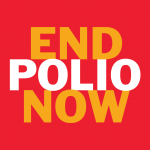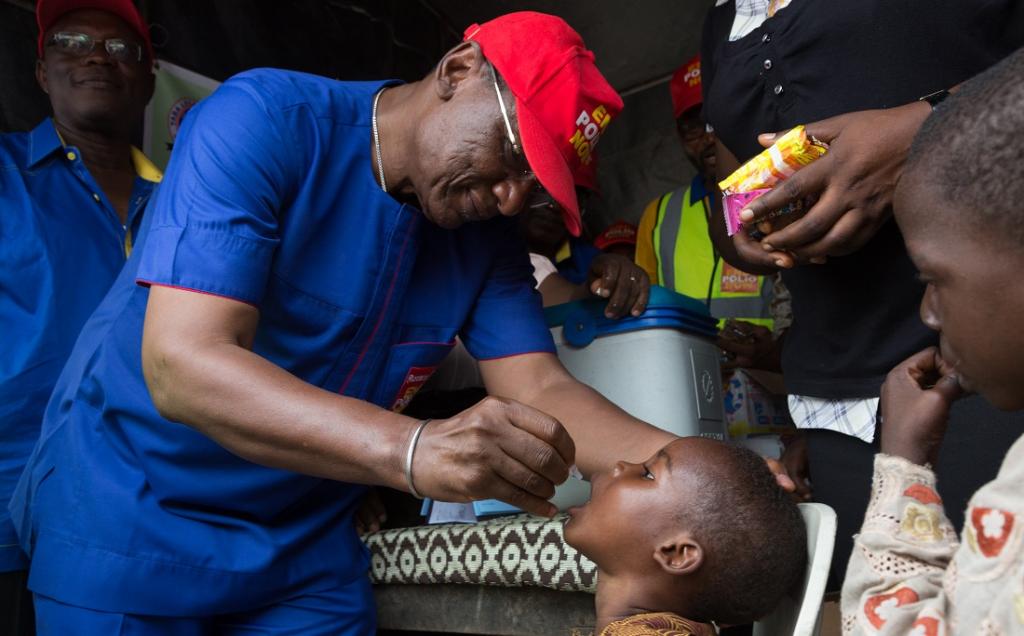Abuja – Vaccines save millions of lives each year. In August 2020, Africa crossed a historic milestone when it was certified as free of wild polio. Vaccination drives, reaching up to 220 million African children multiple times every year, were integral to achieving this historic milestone.
Dr. Tunji Funsho is a Nigerian cardiologist and Chair of Rotary International’s PolioPlus Committee in Nigeria. In 2020 he was listed as one of Time magazine’s 100 most influential people for his contribution to the fight against polio in Africa. Here he shares lessons on the crucial role of vaccines and the work still needed to end all forms of the poliovirus.
In 2020, the WHO African Region was certified free of wild poliovirus – a monumental achievement. What made this possible?
This milestone is a monumental achievement and a huge step forward on the road to global polio eradication. Now, five of the six WHO regions – representing over 90% of the world’s population – are free of the wild poliovirus.
But this was no easy feat, and the Kick Polio Out of Africa campaign – an initiative Rotary and our Global Polio Eradication Initiative (GPEI) partners launched in 1996, when we joined with Nelson Mandela to prioritize Africa’s commitment to polio eradication – helped us to jumpstart our efforts.
That campaign, in concert with the efforts of our nearly 32 000 members in Africa, GPEI partners, parents, religious leaders, local and national government officials, helped us to reach this public health milestone.
These individuals escalated their efforts to reach every child with the polio vaccine, and in particular, frontline health workers travelied by foot, boat, car, and bike to vaccinate children, including those in regions rife with insecurity. They delivered 9 billion doses of the oral polio vaccine, averting an estimated 1.8 million cases of wild poliovirus in Africa.
Notably, these health workers sacrificed their lives in carrying out these activities, and to recognize these selfless individuals, we established the Rotary PolioPlus Memorial Scholarship. The scholarship is awarded annually to master’s-level students pursuing degrees in public health.
Ultimately, the success in eliminating wild polio throughout the African region is proof that with strong commitment, coordination, and perseverance, polio eradication is possible, and I am confident that the region can sustain its wild poliovirus-free status.
Despite this, the WHO African Region reported cases of circulating vaccine-derived poliovirus in at least 16 countries last year. What are some of the challenges that remain, and what can we do to finish the job on polio in Africa?
The wild virus continues to circulate in Pakistan and Afghanistan and that remains a primary challenge. We must keep working to vaccinate every last child and strengthen routine immunization to keep immunity levels high so the virus does not return to Africa.
However, the African region is affected by circulating vaccine-derived polioviruses (cVDPVs). Vaccine-derived polio occurs if the weakened strain of the poliovirus contained in the oral polio vaccine circulates among an under-immunized population for a long time. If not enough children are immunized against polio, the weakened virus can pass between individuals and over time genetically revert to a form that can cause paralysis.
At this juncture, it’s crucial to strengthen the quality of polio vaccination campaigns and implement new strategies and tools – such as a modified version of the vaccine that has less risk of mutating – as approved and available to raise population immunity levels.
Global wild polio certification is the first step in the process of stopping the use of the oral polio vaccines. And, once the world is certified wild polio-free and validated the absence of circulating vaccine-derived polio outbreaks, the use of oral polio vaccine will be stopped to eliminate the long-term risk of vaccine-derived polioviruses.
How has Nigeria’s experience in fighting polio helped in responding to other disease outbreaks, such as Ebola and COVID-19?
The polio eradication infrastructure that Rotary and WHO helped build is now being used to respond to COVID-19 and for decades has helped protect children from other vaccine-preventable diseases.
It’s what Rotary calls the “Plus” in “PolioPlus”, as PolioPlus is our polio eradication programme that dates back to 1985.
The “Plus” means that in Nigeria, and across the African region, polio workers help support routine immunization against other vaccine-preventable diseases; have stopped Ebola and yellow fever outbreaks; deliver bed nets to protect against malaria, and provide information to mothers on the benefits of breastfeeding.
The polio programme is also at the foundation of disease surveillance systems across Africa for measles, neonatal tetanus, rubella, meningitis, rotavirus, and yellow fever.
Now, Rotary members are leveraging their polio know-how at the local level to support their health authorities in COVID-19 vaccine introduction and delivery via advocacy, sensitization and awareness building, monitoring coverage, and addressing vaccine hesitancy.
How has COVID-19 affected polio eradication efforts in Africa?
Despite the challenges of the past year during the global pandemic, Rotary and our GPEI partners remain focused on fulfilling our promise of a polio-free world.
That said, polio immunization activities across the world (in Africa and beyond) were temporarily paused at the beginning of the pandemic, although critical activities such as surveillance continued.
Polio immunization campaigns resumed in July 2020 in affected countries, with all precautions are taken to protect frontline workers and communities, in alignment with COVID-19 prevention measures.
Vaccine hesitancy and misinformation is a growing challenge. How can we combat the spread of misinformation and build confidence and trust in vaccines?
This is a growing challenge, but not a new one. For example, in Kano in 2004, there was a huge outbreak of wild polio as a result of a vaccine boycott instituted by state and community leaders based on many false beliefs.
Ultimately, all stakeholders joined in the collective responsibility to protect Nigeria – and Africa’s – children against wild polio, and synchronized immunization campaigns in 23 countries across sub-Saharan Africa, reaching 80 million children.
Now, we again must think in terms of collective responsibility as we address the spread of misinformation and work to build trust in coronavirus vaccines.
In Nigeria, Rotary and its partners are educating a variety of groups (health workers, media, government, traditional and religious leaders, etc.) about the importance of COVID-19 immunization and are also dispelling vaccine myths and misinformation online.
And Rotary clubs and members throughout the country are working with political leaders to secure COVID-19 immunization support and are also preparing to develop and share pro-vaccination messaging (for example, radio ads) and help people register for vaccination appointments.
CC: WHO

